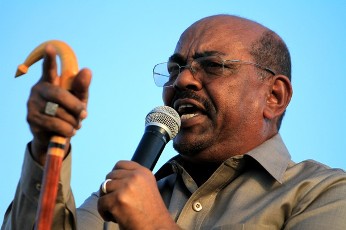Bashir willing to quit ‘if the people don’t want him’
January 25, 2011 (KHARTOUM) – The Sudanese President Omer Hassan Al-Bashir on Tuesday vowed to step down if he felt that the people do not want him.

“We will not go outside Sudan [if a revolution breaks out] but we will be buried here,” he added.
The Sudanese leader, who came to power through a coup in 1989, made reference to the toppling of Tunisian president Zain al-Abdeen Ben Ali this month after weeks of demonstrations that overwhelmed the security agencies in the country.
“We are the people of intifadas and people know this. We were never imitators” he said before extending congratulations to the Tunisian people and affirming his country’s support to them.
Bashir took an implicit hit at opposition parties by saying that the Sudanese people disappointed those who thought that recent government decisions increasing food prices would make them take the streets.
This is the second time the Sudanese leader mentions the Tunisian revolution in one of his speeches.
Ben Ali, who ruled Tunisia for more than 23 years, fled to Saudi Arabia after weeks of protests. His departure resonated in other Arab states with restless populations and long-standing rulers.
People across the region have watched enthralled as events unfolded in Tunisia, an unprecedented spectacle in the Arab world, where authoritarian leaders can usually only be dislodged by army coup, assassination or their own mortality.
Arab rulers who for the most part been in power for decades appeared to be stunned by the turn of events amid fears of a domino effect in their own countries.
On Tuesday similar demonstrations took place in Egypt but a less wider scale than that of Tunisia yet still large by the country’s standards.
Opposition parties have warned that the Tunisian example could be repeated in Sudan particularly after the government decided to lift food and petroleum subsidies. They threatened to take the streets of the government does not reverse these decisions and open up political freedoms.
Already small protests took place in Northern Sudan over soaring food prices.
Bashir also reiterated his intention to enforce Islamic Shari’a law in the North after the inevitable secession of the South. He rejected views that it was the implementation of Shari’a that pushed Southerners away.
The independence vote caps the 2005 Comprehensive Peace Agreement (CPA) that ended decades of civil war between the mostly Muslim north and the south, where most follow Christianity and traditional beliefs.
Preliminary results show a near perfect vote in favor of the South’s independence.
“Secession has become a reality — 99 percent of southerners chose separation but we will not be mourning … we will go to the south and celebrate with them,” Bashir said.
“South Sudan separation will not be the end of history, but rather a new stage for building Sudan,” Bashir added.
The North is wary over the loss of revenues from oil fields that are mostly in the South which could compound its economic woes.
(ST)
